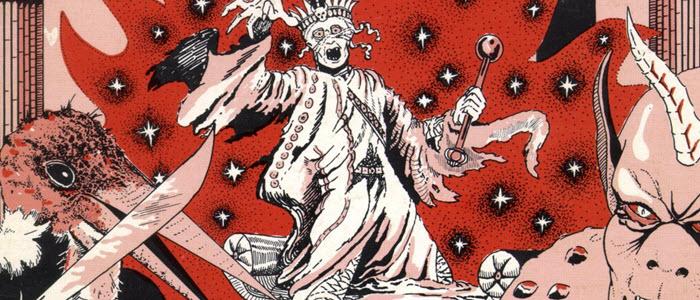 Most RPG module art is useless – we should expect more from adventure art. Continue reading Most Art in RPG Adventure Modules is a Waste of Time
Most RPG module art is useless – we should expect more from adventure art. Continue reading Most Art in RPG Adventure Modules is a Waste of Time
Category: Theory
Theoretical topics related to role playing games
How are Nameless Things Older Than Sauron?
 Gandalf says there are creatures older than Sauron in Middle Earth. If Sauron is an immortal Maiar, how is that possible? Continue reading How are Nameless Things Older Than Sauron?
Gandalf says there are creatures older than Sauron in Middle Earth. If Sauron is an immortal Maiar, how is that possible? Continue reading How are Nameless Things Older Than Sauron?
How was Isildur Able to Curse the Men of Dunharrow?
 Oaths and curses figure strongly in the fantasy works of J.R.R. Tolkien because of their context within Old English / Old Norse speaking cultural traditions. An oath-breaker was a Nīþ, an extreme social outcast. Oath-breaking is the worst sort of violation and betrayal seen time and again in Tolkien’s works. Continue reading How was Isildur Able to Curse the Men of Dunharrow?
Oaths and curses figure strongly in the fantasy works of J.R.R. Tolkien because of their context within Old English / Old Norse speaking cultural traditions. An oath-breaker was a Nīþ, an extreme social outcast. Oath-breaking is the worst sort of violation and betrayal seen time and again in Tolkien’s works. Continue reading How was Isildur Able to Curse the Men of Dunharrow?
Twin Peaks 2014: I’ll See You Again in 25 Years
The original Twin Peaks took place in 1989, meaning the ominous meeting of Laura Palmer and a much older Dale Cooper is about to take place. Even though its clear that David Lynch is going to do the forthcoming Blu Ray version of Twin Peaks some justice, it seems very unlikely we’ll actually get a 25 years later story.
This is what I would do to kick off a first episode of a new Twin Peaks show… Continue reading Twin Peaks 2014: I’ll See You Again in 25 Years
The GM’s Job is to be Defeated by the Players…
I wanted to make a quick response to Troll in the Corner’s Gamemastering 211: Advanced GMing for Majors (Introduction) statement:
To put it bluntly, the GM’s job is to be defeated by the players in the most entertaining way for everyone involved. With this core concept in mind, it’s easy to see how the role of GM can be both fulfilling and frustrating. There are, of course, many other responsibilities that fall to the GM, plenty of which are enjoyable.
He’s got a lot of very good advice, but this tidbit sends the wrong message in an attempt at brevity. This might be the case if the GM was structuring his adventure like a story or video game, with increasing levels of difficulty based on linear encounters, so that each encounter is progressive rather than simulationist. Another exception might be if its a simple dungeon crawl where the party is never expected to leave the confines of the dungeon. But in either case, it creates the wrong sort of dichotomy that the players are actually competing against the GM; that the players have to defeat the GM, or the GM has to defeat the players. In that case, the GMs impartiality and fairness could be called into question.
OSR: There’s A Little More to it Than That
Boingboing’s Peter Bebergal‘ Old School Dungeons & Dragons: Wizards of the Coast’s Problem Child analyzed OSR in a way I found oversimplified this interesting movement. Continue reading OSR: There’s A Little More to it Than That
Role Playing Games Aren’t Storytelling
While there are story-like elements in role-playing games, these two things are just not the same. Jasyn Jones, aka Daddy WarPig makes a great argument how the two are different, specifically to define what makes story games different from role-playing games. His definition is great, but I’ll go so far as to say that story games are not storytelling either. Story games have storytelling-like elements, and so do role-playing games. But those storytelling-like elements are different. Continue reading Role Playing Games Aren’t Storytelling